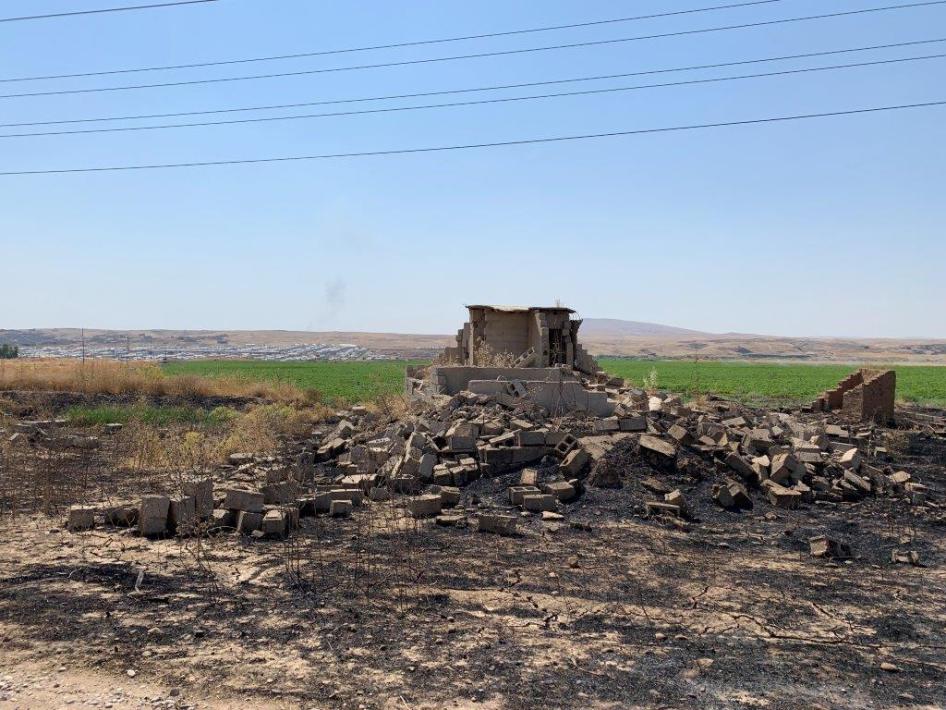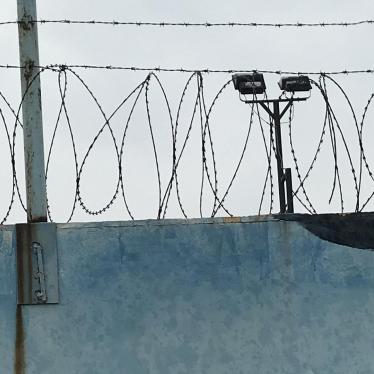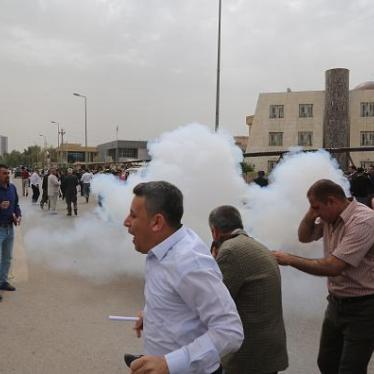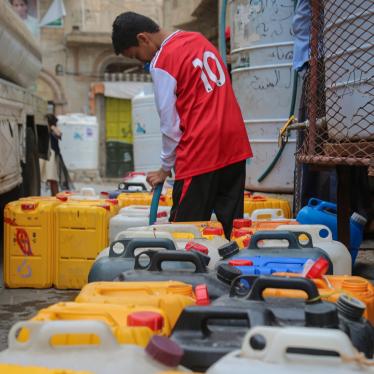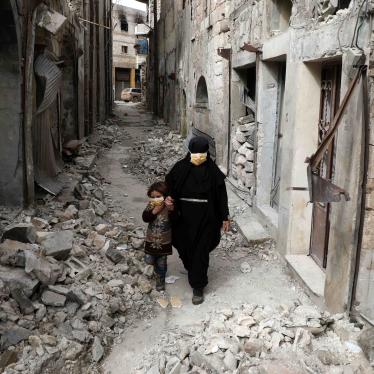(Beirut) – The Kurdistan Regional Government (KRG) is preventing about 4,200 Sunni Arabs from returning home to 12 villages east of Mosul, Human Rights Watch said today. More than three years after the Hamdaniya district was retaken from the Islamic State (also known as ISIS), in one area KRG authorities have only allowed Kurdish residents and Arabs with KRG ties to return, in violation of international humanitarian law.
The Arab families seeking to return home had fled primarily to ISIS-controlled Mosul during fighting in 2014. Approximately 3,400 Sunni Arabs have been residing in camps for the displaced with dwindling services, according to aid workers. Affected families said they have been blocked from their homes and farmland and unable to earn a living. A KRG official wrote in an email to Human Rights Watch that residents were free to return to their homes, but provided Human Rights Watch with a list of Nineveh villages that were difficult to return to, identifying six from Hamdaniya as “blocked” for return.
“The Kurdistan Regional Government is preventing thousands of Arab villagers from returning home without a lawful reason,” said Lama Fakih, acting Middle East director at Human Rights Watch. “The fact that the KRG is permitting Kurdish and well-connected Arab residents back suggests that these villagers are being improperly punished.”
Human Rights Watch has conducted three investigations into the KRG’s prevention of returns to the Hamdaniya district since 2016, most recently in June 2019, when we interviewed 11 Arab residents of Hasansham camp from the villages of Hasansham, Manquba, Shirkan, and Tal Aswad.
The KRG’s coordinator for international advocacy, Dr. Dindar Zebari, wrote on August 10 in response to a Human Rights Watch letter that in the 15 villages Human Rights Watch investigated, population counts showed that there had been few or no returns to 6 of the villages and minimal returns to 2. In 4 villages, about half the population had returned. In only 3 villages had all or nearly all residents returned. Residents blocked from returning said that these 3 villages were either predominantly Kurdish or had Arab residents with strong KRG ties.
Zebari’s information matched satellite imagery analysis from 2016 to 2019 that identified signs of reconstruction and needed reconstruction of many area buildings.
Sunni Arab residents and aid workers disputed claims that authorities were willing to investigate reported cases of blocked return. After anti-ISIS forces retook Mosul in November 2016 and the KRG had put in place a security and civil administration system in the area, former residents sought to return to Hamdaniya district. However, Iraqi forces redirected the displaced to the nearby Hasansham camp. After one month at the camp, the KRG’s security forces, Asayish, informed them without a clear explanation that they were not allowed to return home. Families and aid workers said that in late 2017, Asayish reiterated that they were not allowed to return home but could leave the camps to move to the broader Mosul area or to KRG-controlled Erbil, leading some families to leave the camps.
“Families like mine have become victims of abuse because we went to Mosul when ISIS came, instead of fleeing towards the Kurds,” said a 69-year-old Arab villager from Manquba. “Now we are punished because we didn’t go to [Kurdish-controlled] Kalak.”
KRG officials, in communications with residents, aid workers, and Human Rights Watch, have provided reasons for blocking returns to the district: inadequate services, unexploded ordnance, uncleared landmines (including those of an improvised nature), property destruction; social conflicts and property and land ownership issues, concerns about attacks by villagers who had joined ISIS, and security issues arising from the September 2017 KRG referendum on independence, which makes the area a front line if there is future fighting between Kurdish and Iraqi forces.
Under international humanitarian law, the forced displacement of civilians is prohibited except when necessary to protect civilians or for imperative military reasons, and then only for as long as needed. Possible future hostilities are not a lawful basis. Under the Rome Statute of the International Criminal Court, it is a war crime to order the unlawful displacement of civilians. Furthermore, people may only be punished for crimes for which they are responsible, after a fair trial to determine individual guilt. Imposing collective punishments on families, villages, or communities violates international humanitarian law and amounts to a war crime.
Actions imposed for security reasons need to be according to law, proportionate, and have a legitimate aim, Human Rights Watch said. In addition, Human Rights Watch found that the displacement camps are also located in the so-called “front line” area and that the KRG has allowed some residents to return to certain villages in the area. With respect to landmines, international demining organizations have conducted considerable survey and clearance activity in the vicinity since 2016 and, if mines remained a genuine threat, no villagers should have been allowed to return.
Satellite imagery analysis shows that since 2016 the KRG military forces, the Peshmerga, have deployed and built significant military infrastructure in four of the villages, none of which have received significant population returns. The KRG should immediately remove all restrictions preventing the return of residents where there is no military necessity for doing so and investigate government officials who have been preventing lawful returns, Human Rights Watch said.
“KRG authorities should not prevent families from returning to their villages because they want to punish the community,” Fakih said. “These villagers have the right to return to their own land and homes.”
Flight and Impact of Displacement
In August 2014, ISIS forces, after capturing the city of Mosul, took control of Hasansham and surrounding areas, which had been under KRG control since 2003. Residents said they fled their villages once fighting between ISIS and the Peshmerga broke out. They said that most Arab families fled in the direction of Mosul, because ISIS told them the city was safer. However, almost all Kurdish families fled in the direction of Erbil, taking refuge in Kalak and other KRG-controlled areas.
A 50-year-old man from the village of Shirkan said that the local Kurdish families fled to areas under KRG control while most Arab families fled to Mosul. “I heard in 2017 from camp security that the Peshmerga allowed the 20 Kurdish families from our village to return home,” he said. Human Rights Watch verified the return of Kurdish villagers to Shirkan during a July visit. He said that camp officials had told him he was not allowed to return home, without providing him with a clear reason why.
A 63-year-old man from Ehsar said that only his Arab neighbors who had personal ties to the Peshmerga said they were allowed to return to his village. Only 8 people out of an original population of 60 have returned to Ehsar, according to the KRG’s population count.
Three camps in the Hasansham and Khazir areas are holding about 3,400 displaced people from 11 surrounding villages, according to camp management. Another 800 people, including some from a twelfth village, were living outside the camp in another location, aid workers said. Some of the villages are historically Arab while others are mixed Arab-Kurdish. The camps are run by a nongovernmental organization linked to the Kurdistan Democratic Party, one of the governing parties in the KRG, and the Asayish manages camp security. Management at all three camps said that funding shortfalls over the last two years had resulted in aid agencies suspending and reducing services to camp residents.
Most of the families interviewed said that before fleeing their homes, farming had been their main source of income. All said that since 2014 they had not been able to farm their land, even after the KRG regained control and fighting had ceased. Almost all the families said that they had been unable to find any paid employment since moving to the displacement camp.
One former camp resident, 36, said he moved to Mosul and was living with his family in an abandoned building and working as a taxi driver. In his village he used to make about US$16 a day but now makes as little as $8. His 14-year-old daughter is not going to school because he cannot afford a bag, books, and appropriate clothing for her.
A 45-year-old laborer from Hasansham who has not been allowed to return said he can see his destroyed home from his tent in the displacement camp: “I want to go back to my village because here in the camp we don’t have a future. How long are we going to stay here? No work, bad education, no proper health care, we are without hope.”
Health professionals providing mental health and psychosocial support in the camps identified that families showed signs of heightening psychological distress and frustration because they were being prevented from returning home, findings consistent with a recently published report on displaced families in Iraq.
Advocating Villagers’ Return
Several aid workers in the camps told Human Rights Watch that senior aid officials had been advocating since 2018 for the return of the 4,200 people with senior KRG officials, local mayors, the governor of Nineveh, the local Peshmerga unit, and members of Parliament in Baghdad. In June 2018, then-Prime Minister Nechirvan Barzani agreed with aid agencies that all Arab families should be allowed to return and instructed the KRG’s Ministry of Interior to follow up, two aid workers present said. The Erbil Joint Crisis Coordination Centre, established under the KRG’s interior ministry in 2014 to “coordinate all matters related to crisis management and response in the Kurdistan Region,” informed humanitarian partners in September 2018 that the KRG’s interior ministry and Baghdad authorities had agreed to allow the families to return. However, in October, a high-ranking Peshmerga commander told senior aid officials that returns would only be permitted if there was a political agreement between the KRG and the Iraqi government to “ensure no hostilities in the area,” the aid workers said.
Families that sought permission to return with KRG and Baghdad officials said the officials told them the decision was “not in their hands” but in the hands of the Peshmerga.
Area Contamination
At a July 2018 meeting with senior aid officials, a high-ranking Peshmerga commander raised concerns that Hamdaniya villages were contaminated with landmines (including those of an improvised nature) and unexploded ordnance, according to several aid workers. Zebari’s email to Human Rights Watch also noted the presence of unexploded ordnance and landmines. However, these concerns do not appear to be the reason KRG authorities have not allowed families to return to their villages.
Three demining organizations provided Human Rights Watch with maps showing clearance activities in the area, which demonstrates that considerable clearance activity was conducted in and around the villages since 2016. Human Rights Watch and aid workers have also observed shepherds grazing their sheep throughout the area, including in abandoned villages, and Peshmerga driving through the villages. The KRG authorities have allowed some residents to return to certain villages, so it is unclear why return would be safe for some but not others.
If landmine or explosive remnants of war contamination concerns persist in some of the villages of blocked return, KRG authorities should direct mine clearance organizations to provide additional mine risk education to the families in the camps. They should ensure, with the Iraqi government’s Directorate of Mine Action, which oversees work in the return areas, that demining organizations survey and clear high priority areas like main roads and public spaces, and mark other areas of contamination. The KRG should also instruct security forces to accompany camp residents on “go-and-see” visits, assisting them in avoiding any possible unexploded ordnance or landmine.
